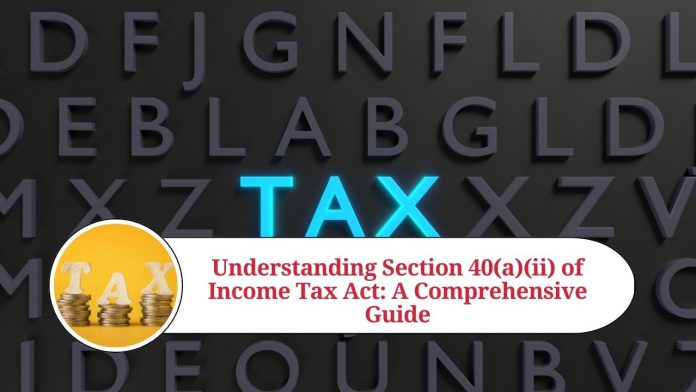Section 40(a)(ii) of the Income Tax Act is an important provision that deals with the disallowance of expenses incurred by a business that are not deducted while calculating taxable income. This provision comes into play when a business fails to deduct tax at source (TDS) on certain payments made to suppliers or contractors. In this blog, we will take a closer look at Section 40(a)(ii) and understand its implications for businesses.
What is Section 40(a)(ii)?
Section 40(a)(ii) of the Income Tax Act states that any expenditure or allowance which is deductible under Sections 30 to 38 of the Act shall be disallowed in computing the income chargeable under the head “Profits and Gains of Business or Profession” if the tax has not been deducted at source or after deduction has not been paid during the previous year.
In simple terms, if a business has made payments to suppliers or contractors but has not deducted TDS or failed to deposit the TDS amount with the government, then the corresponding expenses will be disallowed while calculating taxable income.
For example, if a business paid a contractor Rs. 10 lakhs for services rendered but failed to deduct TDS of Rs. 1 lakh, then the entire payment of Rs. 10 lakhs will be disallowed while calculating taxable income.
Exceptions to Section 40(a)(ii)
There are certain exceptions to Section 40(a)(ii) where the disallowance of expenses does not apply. These exceptions include:
- Where the payee has already paid tax on the income received.
- Where the payee is not liable to pay tax on the income received, such as in the case of payments made to government agencies.
- Where the payee is a non-resident and the income is not taxable in India.
- Where the payee is a resident and the income is exempt from tax under the Income Tax Act.
Implications of Section 40(a)(ii) for Businesses
Section 40(a)(ii) has significant implications for businesses as it can lead to a higher tax liability. If a business fails to deduct TDS or deposit the TDS amount with the government, then the corresponding expenses will be disallowed while calculating taxable income. This means that the business will have to pay tax on a higher income, resulting in a higher tax liability.
Therefore, it is essential for businesses to comply with the TDS provisions and ensure that the TDS amount is deducted and deposited with the government within the specified time limit. Failure to do so can lead to penalties and interest charges in addition to the disallowance of expenses.
Conclusion
Section 40(a)(ii) of the Income Tax Act is an important provision that businesses need to be aware of. It deals with the disallowance of expenses if the TDS amount has not been deducted or deposited with the government. Therefore, businesses must comply with the TDS provisions to avoid penalties and interest charges, as well as the disallowance of expenses while calculating taxable income.
Read more useful content:
- section 234e of income tax act
- section 286 of income tax act
- section 90a of income tax act
- section 40a(7) of income tax act
- section 226(3) of income tax act
- section 24 of income tax act
Frequently Asked Questions (FAQs)
Q1. What is Section 40(a)(ii) of the Income Tax Act?
A1. Section 40(a)(ii) of the Income Tax Act is a provision that deals with the disallowance of expenses incurred by a business if the tax has not been deducted at source or after deduction has not been paid during the previous year.
Q2. Which expenses are disallowed under Section 40(a)(ii)?
A2. Any expenses or allowances which are deductible under Sections 30 to 38 of the Income Tax Act shall be disallowed in computing the income chargeable under the head “Profits and Gains of Business or Profession” if the tax has not been deducted at source or after deduction has not been paid during the previous year.
Q3. What is TDS?
A3. Tax Deducted at Source (TDS) is a tax that is deducted by the payer while making payments to suppliers or contractors. The TDS amount is then deposited with the government.
Q4. What happens if a business fails to deduct TDS or deposit the TDS amount with the government?
A4. If a business fails to deduct TDS or deposit the TDS amount with the government, the corresponding expenses will be disallowed while calculating taxable income. This means that the business will have to pay tax on a higher income, resulting in a higher tax liability.
Q5. Are there any exceptions to Section 40(a)(ii)?
A5. Yes, there are certain exceptions to Section 40(a)(ii) where the disallowance of expenses does not apply. These exceptions include where the payee has already paid tax on the income received, where the payee is not liable to pay tax on the income received, where the payee is a non-resident and the income is not taxable in India, and where the payee is a resident and the income is exempt from tax under the Income Tax Act.
Q6. Can the disallowed expenses be carried forward to future years?
A6. No, the disallowed expenses cannot be carried forward to future years. They are permanently disallowed while calculating taxable income.
Q7. What are the penalties for non-compliance with TDS provisions?
A7. Non-compliance with TDS provisions can lead to penalties and interest charges in addition to the disallowance of expenses while calculating taxable income. The penalty can range from 1% to 1.5% per month of the TDS amount not deposited with the government.




















